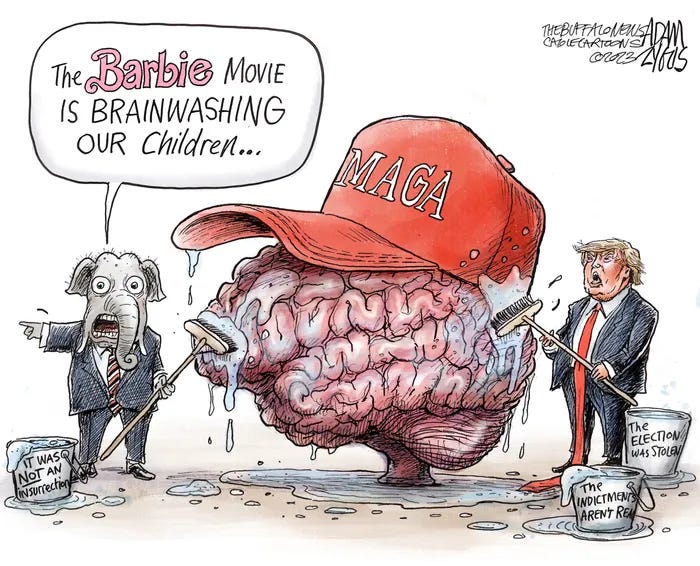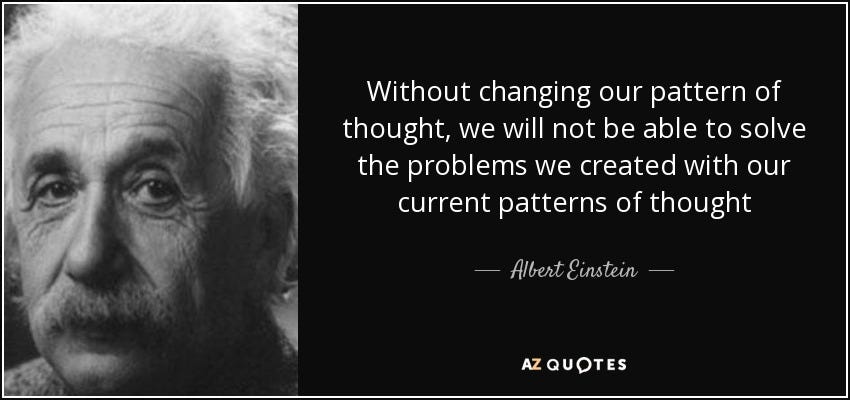Someone must tell the Emperor that he's not wearing any clothes
TAT readers,
It has been a crazy busy week! I expect for all of you as well. While that it has limited my time to write here, I do try to stay professionally current and undated elsewhere, like LinkedIn.
Today there was a post from a national security professional about a new effort at the University of Mississippi, regarding NI/ Narrative Intelligence. It includes some of the biggest research names in my profession. Today’s post is me sharing my expert comments about that effort and why it is not narrative intelligence. With some expert adjustments though, this effort could become a large and important contributor to NI, in support of ethical influence operations, for the US and NATO/ allied national security.
I won’t rehash either article here but simply cut and paste the original post and my comments. The bottom line though is that the US has not been able to operate with effective and ethical influence for over forty years. The highly paid so-called “experts” and their defense contracting firms have relied almost exclusively on academic experience and made-up nonsense gibberish called doctrine. I have commented today only because I want to jump into offering experienced insights at the beginning of the project so that it doesn’t go down the same old road of waste, fraud and abuse of our hard-earned tax dollars as we have for 40 years.
I have enormous respect for most of those mentioned in Joe’s article. Two, of which one is someone I personally know and have no respect for are among the names included. At this professional phase of my life, one of the best offerings that I can still contribute is to “tell the emperor that he’s not wearing any clothes.” Today I did just that, as respectfully as possible.
Nepotistic defense contracting is our Achilles heel, right after not being fully truthful professionally.
You will see what I mean in these comments. As for more interesting content, next week should be a lot more towards truth about our threats outside of my profession and hopefully entertaining as well.
My very best for your weekends,
Paul
First is the original post and my comments follow
The original post that I have taken issue with:
5h • Edited • 5h • Edited •
“The inaugural summit for the National Center for Narrative Intelligence at the University of Mississippi was a huge success! I want to thank everyone who attended. We began with remarks from Ole Miss Chancellor Dr. Glenn Boyce, followed by Senator Roger Wicker. NCNI co-directors Andrea Hickerson, dean of the School of Journalism and New Media, and Wes Jennings, chair of the Department of Criminal Justice & Legal Studies, reviewed the mission and purpose of the center and the summit.
Over the course of the two-day summit, our speakers addressed a wide range of critical topics, including:
National Security & Narrative Intelligence and Advancing Policy Development led by LTG (Ret.) Charles Cleveland, former USASOC, along with William Crowell, former Deputy Director of the NSA. Joining them on the panel were National Security Expert and EdgeTheory advisor Doowan Lee, and 🏴☠️ Zachery Tyson Brown from The Aerospace Corporation.
Scott Nelson led the Whole of National Approach to Narrative Intelligence along side the Honorable Ellen McCarthy, former Assistant Secretary of State for Intelligence and Research. Joining them were SOCOM strategic planner Brad Carr, and Orbis Operations, LLC VP Jennifer Counter.
Adversarial Narrative Operations & National Resilience. Data scientist Rand Waltzman discussed the potential for virtual reality environments to be key tools in information warfare efforts.
We ended the day at the EdgeTheory lab, where our Chief Product Officer Greg Griffith demonstrated how the company's technology can be used to achieve first-move advantage in the information space. Bonus: A demonstration by Ken Sones of a WWII-era Enigma cryptography machine (courtesy of Jim Barksdale).
Kicking off Day 2 was Gregory Easson, Vice Chancellor for Research at Ole Miss, who discussed how narrative intelligence is being used for a commercial seabed mining venture.
Andrea Hickerson discussed the application of narrative intelligence in her research on deepfakes, and Wes Jennings outlined partnerships with other universities and community colleges in which the NCNI is involved.
Our final session was on AI & Innovation Base for Narrative Intelligence. Doowan Lee discussed the role of technology in the cognitive domain. Peter W. Singer, author of LikeWar, spoke on 4 key information warfare tactics. Panelists included tech legend Jim Barksdale (formerly CEO of #Netscape), Christopher Brown, VP of Americas & Aviation Security at FedEx, and McDaniel W., VP of Strategy of Babel Street, and myself.
I am especially grateful to the University of Mississippi, & to Les Spivey who helped me see this vision from the beginning. I also want to thank William Kneip & Provost Noel Wilkin for their tireless support, and Amy Lewis and her team for all their hard work.
As we move forward, we're excited about the transformative potential of our collective efforts in narrative intelligence.”
Joe Stradinger
My comments from his post,
“All,
I will offer the following comments very carefully, due to having enormous respect for most of the names I know or know of well, and two I know, but do not respect their opinions and role in such a project. Those two are not the focus of what follows, but having them as part of this project will not lead to profitable contributions. That is a story for another day.
Today, I will first lead with the fact that NMCI, National Center for Narrative Intelligence, at the fine institution of the University of Mississippi, is a critical effort and must be launched, but cannot nearly reach its potential, as it pertains to influence. It may approach is potential in a decade or two by applying technology alone to the threat but by then, what they are chasing will have already become so distorted by inaccurately focused technology approaches, that failing to define the problem will have most likely created ever-increasing chaos in the audiences they intend to work towards. This alters the game entirely. Their premise fails Einstein’s quote;
“If I had only one hour to save the world, I would spend fifty-five minutes defining the problem, and only five minutes finding the solution.”
The second most important point, that by avoiding solving for “what is the problem” they are attempting an end-run around it. For example, and as we have seen in major bridge collapses, it is not that there were not brilliant and professionally varied professionals working on solutions, but that they were working of failed concepts, antiquated engineering solutions, failed methodology for materials and how much load they can bear, etc. The bridge will still fail.
With the above said, we must go back to Eistein and make a correct diagnosis of the problem while remembering our forty years plus, of failure at influence, in support of national security. In other words, toss aside the gibberish language that the community uses for doctrine. This can be best explained in another Einstein quote, “if you cannot explain it simply, you don’t understand it yourself.”
Third, influence is a human endeavor and without a deep academic understanding of how meaning is made and true operational experience in influence, we will continue our forty plus years of failure in influence. The most succinct issue here is that it is narrative that manages meaning making in humans. All the factors that play into our meaning making, cannot be found in digital technology, not even a quarter of that understanding even exists digitally.
This raises the point that today’s IC/ Intelligence Community, already does not collect half of what is required to understand how to operate effectively in the critical field of ethical influence. Shining a light on the stated role of “Narrative Intelligence” greatly increases the risk that the IC will adopt this as a primary role in supporting influence and ignore the long list of other requirements as developed by true operators.
We have proved that we have the brawn, but little to no brains regarding influence, despite tossing incalculable tax dollars at overpaid and underperforming “expertise” and contractors. Influence is the key objective of everything that a nation does, on or off the battlefield, and it cannot be achieved by any understanding represented by digital technology. Agreed, there have been a success or two in niche communities but not at scale. There no difference here in the Homeland where we have allowed half of US voters to fall victim to state and non-state malign influencers while we continue pursuing “paralysis by analysis.” To make matters worse, we are not even analyzing, “the problem.”
Fourth, there is a huge critical role for technology in influence, but never alone and never as the prime effort. Anyone believing this, has never operated on or off battlefields in full-spectrum influence operations. The role of technology will not be described here for IP/ Intellectual Property reasons but I have had these discussions with some of the names represented in Joe’s post. I will say this though, experience and understanding narrative deeply is part of a real solution to influence. I see no names listed that have either deep academic understanding of narrative or operational experience, executing full-spectrum influence operations. This is in my opinion, a fatal flaw.
Summary
As far as narrative intelligence is concerned, it cannot be done well without a deep understanding of what narrative is and how to operate with it. Let us remember that over the past few years, both narrative and AI have largely become buzzwords or the next, “shiny object” for those seeking large expenditures of our tax dollars. Defense contractors scamper like those loveable cartoon characters called Minions towards every new “shiny object.” Throwing away our hard-earned tax dollars for perpetual failure, is not the recommended solution… ever.
To be clear, I not saying or even implying that is the case with the mostly extraordinary persons in this effort, nor with the University of Mississippi.
What I am saying, is that if we want to solve for solutions to our severe, self-inflicted wound regarding influence in support of national security, we must stop marketing the word narrative for something that it is not. Some of the names included by Joe are remarkably brilliant and again, there is no dishonor from them or UM, but they cannot fully succeed, with the understanding that they are entering this effort with. Certainly, I advocate for not only this project but do not wish to see it end up like all the other wasted and highly profitable defense contracts in this field for the past forty years. To succeed, let us be honest about what this project is and is not.
1. Defining the problem
2. Adding at least, the two missing professions from NMCI noted above, academic, and operational expertise.
3. Effectively weave the fabric of true, agile, and full-spectrum influence operations together as they would be used operationally with both technology and the endless array of other resources.”










